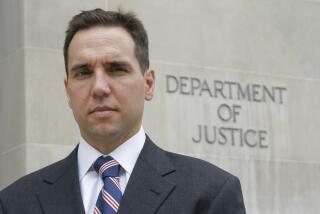Allegations Covered by Ethics Act, Justice Dept. Rules : Independent Counsel Probe of Nofziger Likely
- Share via
WASHINGTON — Justice Department attorneys have ruled that allegations of conflict of interest against former White House aide Lyn Nofziger are covered by the Ethics in Government Act, making him virtually certain to become the third former Reagan Administration official to be investigated by an independent counsel, it was learned Monday.
Court-appointed independent counsels are already investigating alleged misconduct by former presidential aide Michael K. Deaver and former Assistant Atty. Gen. Theodore B. Olson. Both have denied wrongdoing.
Nofziger has been under investigation by U.S. Atty. Rudolph W. Giuliani of New York for his alleged lobbying of a former White House colleague on behalf of Wedtech Corp., a New York-based defense contractor. Nofziger, a partner in a Washington-based public relations business, has refused to comment.
Under the new legal determination by Justice Department lawyers, evidence dealing with Nofziger now will be removed from Giuliani’s office, and the department is expected to prepare a formal request that the U.S. Court of Appeals name an independent counsel to investigate the case, sources familiar with the matter said.
Giuliani’s office was informed Monday of the decision, said the sources, who spoke on condition that they not be identified.
By law, the department has 90 days to conduct a preliminary inquiry to determine if allegations against a current or former official are specific and substantial enough to warrant the appointment of an independent counsel, formerly called a special prosecutor.
In Nofziger’s case, Giuliani’s investigation has practically met that standard already, one source said. Washington attorneys Paul Perito and E. Lawrence Barcella, who represent Nofziger, said Monday: “We would welcome the appointment of a special prosecutor. We believe that, after a full and fair inquiry, we and the government both will be satisfied with the results.”
Besides Wedtech, a second case of lobbying activity was disclosed last week, when it was learned that Nofziger had intervened with a former colleague on behalf of an agricultural firm 11 months after leaving office. Nofziger wrote then-National Security Adviser William P. Clark in December, 1982, seeking his help in preserving a rice contract with South Korea for Comet Rice, a subsidiary of Early California Industries of Los Angeles.
Letter Confirmed
Clark confirmed receipt of the letter but said he took no action.
Under the 1978 Ethics in Government Act, a high-ranking government official who has left his job may not contact his former agency for one year with the intent of influencing officials on behalf of a client. Nofziger left the White House in January, 1982.
Giuliani’s investigation uncovered a lobbying effort by Nofziger in May, 1982, when he wrote then-deputy White House counselor James E. Jenkins, asking help in getting a minority business contract for Wedtech. The firm subsequently was awarded a $31-million engine contract by the Army, and Nofziger received 37,500 shares of Wedtech stock worth several hundred thousand dollars.
In most cases, the ethics law does not apply to former officials who have been out of government for more than two years. But the law applies to Nofziger under a provision covering former presidential campaign officials for as long as that president holds office, the sources said.
Nofziger was Reagan’s campaign press secretary in 1980 before being named White House political director. In 1984, he served as a consultant to Reagan’s reelection campaign.
Deaver has been under investigation since May by an independent counsel for possible violation of conflict-of-interest and perjury statutes. Deaver, a Washington consultant, allegedly contacted White House officials on behalf of foreign and domestic clients less than one year after leaving his job as deputy White House chief of staff in 1985.
Olson is being investigated in response to congressional charges that he gave false and misleading testimony to House investigators in 1983 about documents sought in a controversy over the Environmental Protection Agency’s handling of the Superfund toxic waste cleanup program.
More to Read
Sign up for Essential California
The most important California stories and recommendations in your inbox every morning.
You may occasionally receive promotional content from the Los Angeles Times.










